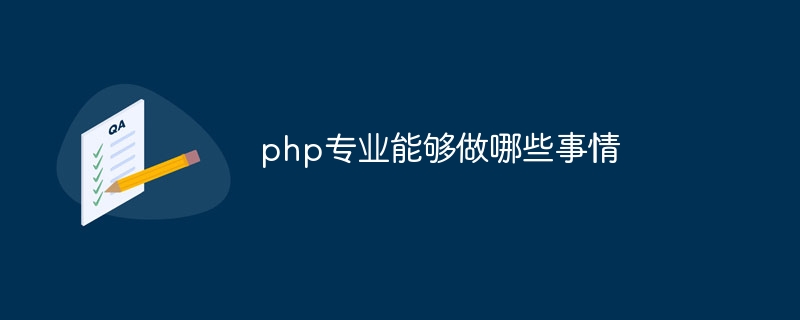
php professional can do: 1. Implement dynamic pages, which can dynamically generate different web content according to user requests and inputs; 2. Process form data, send form data to the database or send emails, etc.; 3. Interact with the database and perform operations such as database query, insertion, update and deletion; 4. Implement user authentication and security control to prevent attacks and injections from malicious users; 5. Can process files and directories; 6. Implement and Integration of other web services and APIs.

The operating system of this tutorial: Windows10 system, PHP version 8.1.3, DELL G3 computer.
PHP is an open source server-side scripting language that is widely used for web development. It is loved by developers for its simplicity, ease of learning and flexibility. The following will introduce what PHP majors can do.
First of all, PHP can implement dynamic web pages. By embedding into HTML, we can insert PHP code into the web page, which will be executed on the server and return a dynamically generated HTML page to the user. In this way, we can dynamically generate different web page content based on user requests and inputs, achieving a more personalized and rich user experience.
Secondly, PHP can handle form data. In web development, forms are a very common and important component. Users can fill out forms on a web page and then submit the data to the server for processing. PHP provides a wealth of form processing functions and methods that can easily obtain, verify and store user-submitted data. We can use PHP to send form data to the database, send emails, or perform other required operations.
Third, PHP can interact with the database. In web applications, large amounts of data often need to be stored and processed. PHP provides a wealth of database extension modules, which can connect to various commonly used database systems, such as MySQL, Oracle, and SQLite, and perform operations such as database queries, insertions, updates, and deletions. In this way, we can easily interact with the database and conveniently manage the data required by the application.
Fourth, PHP can implement user authentication and security control. In many web applications, user authentication is a very important part. PHP provides powerful authentication and session management functions, which can realize user registration, login and logout operations. In addition, PHP also provides a wealth of security control functions and methods, which can filter and verify input data to prevent attacks and injections from malicious users.
Fifth, PHP can handle files and directories. In web development, you often need to read, write, and manipulate files and directories. PHP provides a wealth of file and directory processing functions and methods, which can easily create, copy, move and delete files and directories, as well as read and write the contents of files. In this way, we can easily process and manage files and directories related to the website.
Finally, PHP can achieve integration with other web services and APIs. Today's web applications often need to exchange and integrate data with other web services and APIs. PHP provides various network and HTTP processing functions and methods to easily communicate and interact with other web services and APIs. For example, we can use PHP for data exchange with a social media platform’s API, or for payment integration with a payment gateway.
In summary, PHP major can implement dynamic web pages, process form data, interact with databases, implement user authentication and security control, process files and directories, and integrate with other Web services and APIs. These features make PHP a powerful and rich web development tool that is widely used in the development of various web applications. Whether it is a personal website, e-commerce website or enterprise-level application, PHP can meet the needs of developers and provide reliable and efficient solutions.
The above is the detailed content of What can a PHP major do?. For more information, please follow other related articles on the PHP Chinese website!